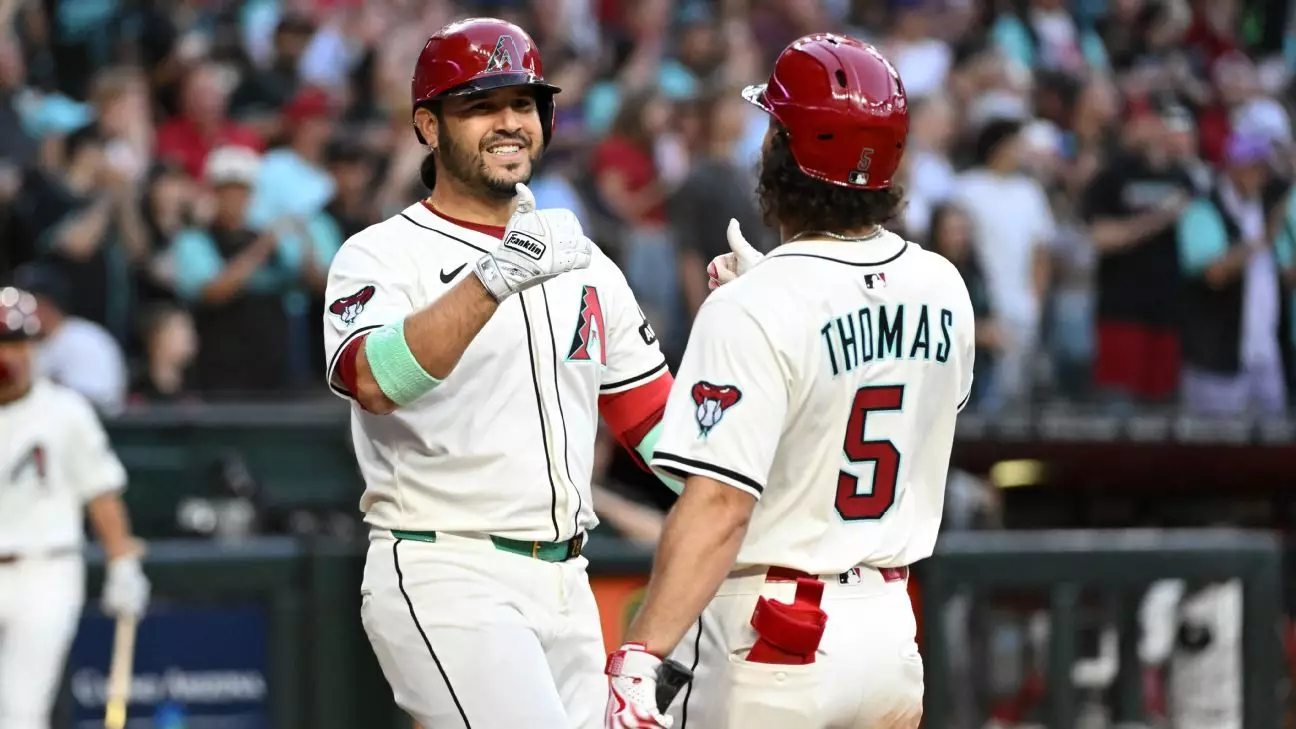In an awe-inspiring display of power, Arizona Diamondbacks’ third baseman Eugenio Suárez etched his name into the annals of Major League Baseball history on Saturday night. Hitting four home runs in a single game is no small feat; only 18 other players have managed this transcendent achievement. Through this unprecedented performance, Suárez not only illuminated his persistently turbulent season but also showcased the intoxicating potential of an athlete experiencing a fleeting moment of pure, gut-wrenching brilliance. Yet, the bittersweet reminder of team success was tenuous, as the Diamondbacks ultimately fell to the Atlanta Braves in a 10-inning showdown, highlighting the fine line between personal triumph and collective failure.
Suárez approached the game with a dismal batting average of .167 and a mere six homers to his credit. This context accentuates the striking nature of his accomplishment. For Suárez, this victory was not just about the four balls that sailed into the stands; it was a vivid reaffirmation of his latent capabilities, a rediscovery of his long-lost rhythm. “What can I say; obviously, it’s awesome,” he reflected, embodying a mix of disbelief and exhilaration. It’s moments like these that make baseball a vastly emotional sport, capable of delivering both inspiration and despair in equal measure.
A Legendary Night Against All Odds
During a night filled with spectacular hits, Suárez expertly navigated the Braves’ pitching, becoming the first player since J.D. Martinez in 2017 to achieve such an accolade for the Diamondbacks. His journey on the field was punctuated by a symphony of cheers from the 43,000-strong crowd, each swing of the bat amplifying the collective heartbeat of the fans. With each successive homer, the electric atmosphere swelled, transforming Chase Field into a coliseum of hope.
Yet, one cannot ignore the cruel twist in this magnificent tale. As Suárez’s fourth homer tied the game at 7, an exhilarating boost of energy surged through the stadium, only for that energy to be swiftly extinguished when the Braves clinched victory in the 10th inning. This sequence serves as a poignant reminder of the existential dilemmas faced in sports: One player can shine greatly, but without team effort, individual accolades can feel hollow. Suárez’s achievement stands monumental, yet it resonates with echoes of discontent, as the Diamondbacks are now the second team in history to lose despite a player hitting four home runs.
The Dichotomy of Personal and Team Success
Baseball, much like life, offers a harsh lesson in probability and potential. For Suárez, the range of emotions following such a remarkable night must have felt almost surreal. How can one glorify a performance while grappling with the stinging reality of a defeat? In his reflection, Suárez mentioned wanting to glorify God for his achievement, delving into a deeper sense of gratitude amidst disappointment. It is a powerful sentiment that taps into the very essence of sports—the drive to celebrate individual accolades while recognizing their interconnectedness with the broader narrative of team dynamics.
His performance, accentuated by stunning statistics—19 hits this season and a league-leading 10 home runs—places Suárez at a fascinating crossroads. He is a player brimming with potential, yet still wrestling with the mounting pressures of consistency and productivity. The night redefined him in the eyes of the fans and critics alike, forcing observers to reevaluate their perceptions of the player beneath the statistics. In terms of baseball, Suárez is emblematic of the modern-day dilemma—flashy performances can obscure underlying challenges, and fans are left wondering if they can rely on their stars when the chips are down.
A Celebration and a Call for Emerging Talent
While it is vital to recognize Suárez’s extraordinary achievement, perhaps even more essential is to empathize with the complexities that athlete experiences. The struggle between individual brilliance and team success is reflective of modern sports culture, and it beckons a call for organizations to nurture their talents more holistically. Teams must prioritize a culture of collaboration and resilience, assuring their players that every swing of the bat is a shared endeavor, an interconnected web of effort and support.
While Eugenio Suárez’s four-homer night will be celebrated by many, it signifies not only the heights of personal excellence but also the sobering reality that triumphs can often be shadowed by defeats. Emerging talents like Suárez need not only personal milestones to commemorate; they need organizations that value collective growth and offer consistent support through both the stellar highs and tumultuous lows that define a sports career.


Leave a Reply